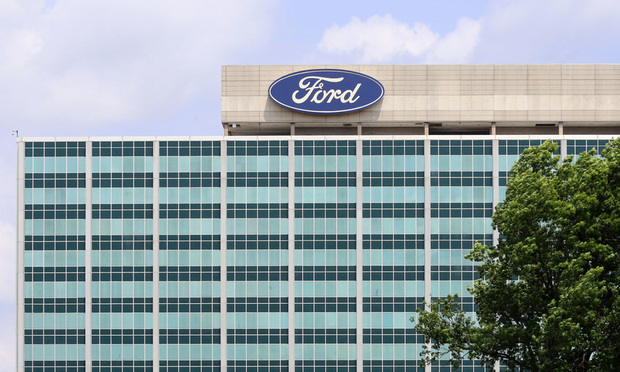Lawyers Picking Jury for High Stakes Ford Truck Crash Trial
Jim Butler of Butler Wooten & Peak leads the plaintiffs team. The Ford defense team includes Randy Evans of Dentons.
March 20, 2018 at 03:06 PM
4 minute read

Lawyers are picking their jury for a wrongful death product liability case against Ford Motor Co. in Lawrenceville, 30 miles north of Atlanta,
Melvin and Voncile Hill were killed in 2014 when their Ford F-250 rolled over. They were farmers in South Georgia on their way to Americus to pick up a tractor part when a tire blew out. Their two sons, Kim and Adam, have sued Ford, alleging that their parents died because the pickup truck's roof crushed them.

The Hills' lead counsel is Jim Butler of Butler Wooten & Peak, who has won verdicts in excess of $100 million against General Motors and Chrysler.
His legal team includes Gerald Davidson Jr. of Mahaffey Pickens Tucker in Lawrenceville, who worked with Butler in a 1993 trial against GM when a jury awarded $105 million to the parents of Shannon Moseley. That verdict—which included $101 million in punitive damages—was later overturned, and the case settled before it was tried again.
The Butler team also includes David Rohwedder of the Butler Wooten firm, based in Columbus and Atlanta. Rohwedder was on Butler's trial team for the parents of 4-year-old Remi Walden against Fiat Chrysler. They won a $150 million verdict, which the judge reduced to a $40 million award. The Georgia Supreme Court upheld the Walden judgment last week.
Brandon Peak, Christopher McDaniel and Ramsey Prather of Butler Wooten are also on the team, as is Michael Gray of Walker, Hulbert, Gray & Moore in Perry.

Ford's lead counsel is D. Alan Thomas of Huie Fernambucq & Stewart in Birmingham, working with Paul Malek of his firm. Their team includes Michael Eady of Thompson Coe Cousins & Irons of Austin, Texas. Their Atlanta lawyers are Michael Boorman and Philip Henderson of Huff, Powell & Bailey and J. Randolph Evans of Dentons.
The lawyers began their second day of jury selection Tuesday in Gwinnett County State Court before Judge Shawn Bratton. But because of the size of the jury pool, they started voir dire Monday in the Gwinnett County Commissioners' auditorium.
The Hill sons have settled with the company that sold the parents a wrongly gauged tire for the pickup that caused the blowout. But they blame the deaths on Ford for cutting costs on materials and knowingly making an unsafe roof, according to a summary their lawyers wrote for the consolidated pretrial order.
“Though marketed as 'Ford Tough' and a 'Super Duty' truck, the roof on the Hills' truck was anything but tough and strong,” the Hills' summary said. “Before Ford manufactured and sold nearly 5 million of these trucks, Ford never physically tested the roof structure. When Ford did conduct a computer aided engineering analysis of the roof structure, the results established that the roof failed to meet Ford's own internal safety standards for roof strength, even though that internal standard required only minimal roof strength.”
The Hills alleged that Ford knew five years before their parents were killed that the roof was vulnerable in a rollover and did nothing to fix the problem.
“To this day, Ford refuses to warn and still has not warned anybody of the dangers of the Super Duty roof structure,” the Hills said.
Ford blamed the deaths on the bad right front tire and poor driver reaction to it.
“In response to the tire failure, Mr. Hill steered the vehicle improperly and caused the F-250 to leave the roadway,” Ford's lawyers wrote in their summary for the pretrial order. “This accident and the injuries to Mr. and Mrs. Hill were caused by the failure of a bad right front tire, steering inputs of Mr. Hill, and severe accident forces.”
The company's lawyers refuted the allegations that the roof was defective and said it was “reasonably” safe.
“Plaintiffs' claim against Ford is that the F-250's roof should have been stronger,” the defense team wrote. “However, the evidence will show that the roof of the F-250 is a strong roof. The evidence will further show that adding additional metal to strong roofs does not improve safety.”
The case is Hill v. Ford, No. 16 C 04179-2.
This content has been archived. It is available through our partners, LexisNexis® and Bloomberg Law.
To view this content, please continue to their sites.
Not a Lexis Subscriber?
Subscribe Now
Not a Bloomberg Law Subscriber?
Subscribe Now
NOT FOR REPRINT
© 2025 ALM Global, LLC, All Rights Reserved. Request academic re-use from www.copyright.com. All other uses, submit a request to [email protected]. For more information visit Asset & Logo Licensing.
You Might Like
View All
Recent FTC Cases Against Auto Dealers Suggest Regulators Are Keeping Foot on Accelerator
6 minute read
Federal Judge Rejects Teams' Challenge to NASCAR's 'Anticompetitive Terms' in Agreement

'Stock Car Monopoly'?: Winston Lawsuit Alleges NASCAR Anticompetitive Scheme
3 minute read
Trending Stories
- 1White & Case KOs Claims Against Voltage Inc. in Solar Companies' Trade Dispute
- 2Avantia Publicly Announces Agentic AI Platform Ava
- 3Shifting Sands: May a Court Properly Order the Sale of the Marital Residence During a Divorce’s Pendency?
- 4Joint Custody Awards in New York – The Current Rule
- 5Paul Hastings, Recruiting From Davis Polk, Adds Capital Markets Attorney
Who Got The Work
J. Brugh Lower of Gibbons has entered an appearance for industrial equipment supplier Devco Corporation in a pending trademark infringement lawsuit. The suit, accusing the defendant of selling knock-off Graco products, was filed Dec. 18 in New Jersey District Court by Rivkin Radler on behalf of Graco Inc. and Graco Minnesota. The case, assigned to U.S. District Judge Zahid N. Quraishi, is 3:24-cv-11294, Graco Inc. et al v. Devco Corporation.
Who Got The Work
Rebecca Maller-Stein and Kent A. Yalowitz of Arnold & Porter Kaye Scholer have entered their appearances for Hanaco Venture Capital and its executives, Lior Prosor and David Frankel, in a pending securities lawsuit. The action, filed on Dec. 24 in New York Southern District Court by Zell, Aron & Co. on behalf of Goldeneye Advisors, accuses the defendants of negligently and fraudulently managing the plaintiff's $1 million investment. The case, assigned to U.S. District Judge Vernon S. Broderick, is 1:24-cv-09918, Goldeneye Advisors, LLC v. Hanaco Venture Capital, Ltd. et al.
Who Got The Work
Attorneys from A&O Shearman has stepped in as defense counsel for Toronto-Dominion Bank and other defendants in a pending securities class action. The suit, filed Dec. 11 in New York Southern District Court by Bleichmar Fonti & Auld, accuses the defendants of concealing the bank's 'pervasive' deficiencies in regards to its compliance with the Bank Secrecy Act and the quality of its anti-money laundering controls. The case, assigned to U.S. District Judge Arun Subramanian, is 1:24-cv-09445, Gonzalez v. The Toronto-Dominion Bank et al.
Who Got The Work
Crown Castle International, a Pennsylvania company providing shared communications infrastructure, has turned to Luke D. Wolf of Gordon Rees Scully Mansukhani to fend off a pending breach-of-contract lawsuit. The court action, filed Nov. 25 in Michigan Eastern District Court by Hooper Hathaway PC on behalf of The Town Residences LLC, accuses Crown Castle of failing to transfer approximately $30,000 in utility payments from T-Mobile in breach of a roof-top lease and assignment agreement. The case, assigned to U.S. District Judge Susan K. Declercq, is 2:24-cv-13131, The Town Residences LLC v. T-Mobile US, Inc. et al.
Who Got The Work
Wilfred P. Coronato and Daniel M. Schwartz of McCarter & English have stepped in as defense counsel to Electrolux Home Products Inc. in a pending product liability lawsuit. The court action, filed Nov. 26 in New York Eastern District Court by Poulos Lopiccolo PC and Nagel Rice LLP on behalf of David Stern, alleges that the defendant's refrigerators’ drawers and shelving repeatedly break and fall apart within months after purchase. The case, assigned to U.S. District Judge Joan M. Azrack, is 2:24-cv-08204, Stern v. Electrolux Home Products, Inc.
Featured Firms
Law Offices of Gary Martin Hays & Associates, P.C.
(470) 294-1674
Law Offices of Mark E. Salomone
(857) 444-6468
Smith & Hassler
(713) 739-1250






